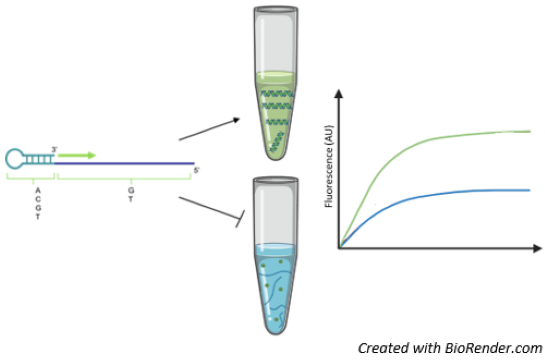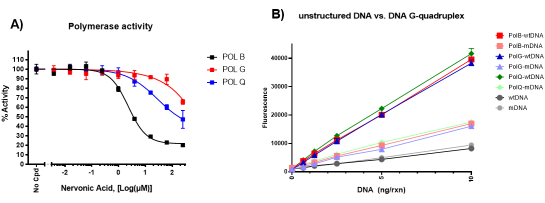DNA Polymerase γ Assay Kit
The DNA Polymerase γ Assay Kit is a fluorogenic assay designed to measure DNA Polymerase γ activity for screening and profiling applications, utilizing the fluorescent nucleic acid dye GroovyGreen™ for the quantitation of double-stranded DNA (dsDNA) products. The kit comes in a convenient 96-well format and contains enough recombinant DNA Polymerase γ enzyme, DR Substrate 3, dNTP mix and buffer for 100 enzymatic reactions.

Figure 1: DNA Polymerase γ Assay Kit mechanism.
DNA Polymerase γ uses available nucleotides to synthesize a DNA strand complementary to the template strand, leading to the formation of double-stranded DNA molecules (dsDNA). The amount of dsDNA formed directly correlates to the polymerase activity and can be quantified by the addition of a fluorescent dsDNA-binding dye which distinguishes dsDNA from ssDNA and free nucleotides. Since the dye emits fluorescence only when bound to the target dsDNA, the fluorometric readouts are low in the presence of a polymerase inhibitor.
Need us to run inhibitor screens or profile your compounds against DNA Polymerase γ? Check out our DNA Replication & Repair Screening Services.
Fluorescence Plate reader capable of measurement at λex502/λem530 nm.
| Catalog # | Name | Amount | Storage |
| 21001 | DNA Polymerase γ (POLG), His-FLAG-Tag* | > 1 µg | -80°C |
| DR Substrate 3 | 36 µl | -80°C | |
| dNTP Substrate Mix | 20 µl | -80°C | |
| 10x DR Buffer 3A | 1 ml | -20°C | |
| 200x GroovyGreenTM Dye | 25 µl | -20°C | |
| 96-well black microplate | 1 | Room Temp |
* The concentration of protein is lot-specific and will be indicated on the tube containing the protein.
Polymerases are the enzymes responsible for synthesizing nucleic acids. Polymerase γ, also known as DNA polymerase subunit gamma, POLG or POLG1, belongs to the Family A of DNA polymerases and corresponds to the catalytic subunit of the mitochondrial DNA polymerase. It works in conjunction with POLG2 to replicate mitochondrial DNA. In addition to its DNA polymerase activity, it has a 3’-5’ exonuclease and a 5’dRP lyase activity for proofreading and repair. Mutations in polymerase γ cause mitochondrial dysfunction, as observed in SANDO (sensory ataxia neuropathy dysarthia and ophthalmoparesis), AHS (Alpers-Huttenlocher Syndrome) and MNGIE (mitochondrial neurogastrointestinal encephalopathy syndrome). Alternatively, the inhibition of DNA synthesis can be used as a therapeutic approach for diseases in which cell division or energetic needs are uncontrolled, such as cancer. Inhibitors such as gemcitabine have proved efficacious in the treatment of hematological and solid tumors (including breast cancer and ovarian cancer), particularly when combined with cisplatin. The use of cisplatin results in severe side effects, so the use of DNA inhibitors can also benefit patients’ care by allowing lower doses of platinum drugs to be used. Further studies into DNA polymerase inhibitors will bring new therapy options to cancer patients.
Berdis A., 2017, Front. Mol. Biosci. 4: https://doi.org/10.3389/fmolb.2017.00078


